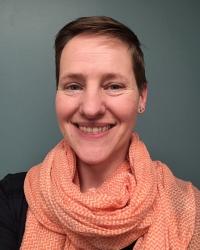
Contact Information
Biography
Marieke van Eijk is a medical anthropologist who examines the financial and institutional structures in US healthcare that create health disparities for underserved communities and give rise to precarious labor conditions for health care workers.
Current project: "Healthcare for Some, Medical Debt for Many: Navigating Uncovered Medical Expenses in the U.S. Health System."
This project, conducted by undergraduate and graduate students in anthropology, examines the severe impact of medical debt and uncovered healthcare costs on people's health and wealth. The research focuses on non-profit organizations, community organizations, and faith-based groups that seek to mitigate uncovered medical expenses on people's behalf. The project also draws out people's experiences struggling to pay for healthcare.
- Read the interview with students and professor on medical debt in UW The Daily: UW anthropology students create medical debt guide amid growing health care instability
- Listen to the podcast episode to learn more about why medical debt is a chronic condition, and not a personal fault: Podcast Episode !
Read the Medical Debt Guide to help navigate medical debt.


Collaborative research
With colleagues at the Center for Health Workforce Studies, Van Eijk has examined the work of various health care workers to address and reduce health inequities. The projects identified the role of health insurance navigators in mitigating access to health insurance coverage, the importance of birth doulas improving health in underserved communities and the work of emergency medical responders, community paramedics, and home health aides during the COVID-19 pandemic.
For a list of the projects and their publications, click here: Projects: https://depts.washington.edu/fammed/chws/
Teaching
Van Eijk's classes focus on addressing structural inequalities from various angles as it pertains to medical anthropology, health care, medicine and institutions. Students learn that social inequalities lie at the center of people’s substantial health burdens. Van Eijk teaches in the areas of health care insurance; Health care in jails and prisons; Labor in healthcare; Health inequities; The anthropology of care, and other topics.
Research
Selected Research
- Lee, D., van Eijk, M.S. Oster, N.V., Frogner, B.K., & Skillman, S.M. (2024). Home care worker’s access to and use of benefits during the COVID-19 pandemic: A mixed-methods study. Home Health Care Management and Practice.
- Paula M. Kett, Ph.D., Marieke S. van Eijk, Ph.D., Grace A. Guenther, Susan Skillman. “’ This work that we’re doing is bigger than ourselves:’ Experiences and Labor Conditions of Doulas Working in Underserved Communities in the United States.” Perspectives on Sexual and Reproductive Health
- Van Eijk, Marieke S. PhD; Kett, Paula M. PhD, MPH, RN; Prueher, Lillian PhD, MPH; Frogner, Bianca K. PhD; Guenther, Grace A. MPA. “Financial Instability of Federal Navigator Program Challenges Organizations to Help Uninsured Enroll in Health Insurance Coverage.” Journal of Health Care for the Poor and Underserved
- Marieke S. van Eijk, Grace A. Guenther, Andrew D. Jopson, Bianca K. Frogner, and Susan M. Skillman. “Health Workforce Challenges Impact the Development of Robust Doula Services for Underserved Populations in the United States.” The Journal of Perinatal Education.
- Van Eijk, et al. 2022. Addressing Systemic Racism in Birth Doula Services to Reduce Health Inequities in the United States. Health Equity 6.1: 98-105. Health Equity
- Van Eijk, et al. 2022. Lack of Consistent Investment in Federal Insurance Navigator Program Undermines Navigators’ Equity Work in Vulnerable Communities. Journal of Public Health Management and Practice. Published ahead of print. https://journals.lww.com/jphmp/Abstract/9000/Lack_of_Consistent_Investment_in_Federal_Insurance.99107.aspx
- O'Hare, Rodriquez, and Van Eijk. 2021. Supporting the Employment Goals of People With Kidney Disease. Editorial. American Journal of Kidney Diseases 78.6: 772-773 https://www.ajkd.org/article/S0272-6386(21)00666-1/fulltext
- M.van Eijk. 2019 Studying Health Care Institutions: Using Paperwork as Ethnographic Research Tools. Ethnography: 1-20.
- The Anthropology of 'Boring' Things. Special series. Second Spear Medical Anthropology Quarterly online
- Financial Stories of 'Boring' Medical Codes. Second Spear Medical Anthropology Quarterly online.
- Insuring Care: Paperwork, Insurance Rules, and Clinical Labor at a U.S. Transgender Clinic. Culture Medicine and Psychiatry. 2017. DOI:10.1007/s11013-017-9529-8
- Book review “Loneliness and its Opposite,” by Don Kulick and Jens Rydström. Medicine, Anthropology and Theory 3(2):325-327. 2016
- “Transgenderzorg als zorgpraktijk: Medische aannames, instituties, en financiën in de Verenigde Staten.” [Transgender care as care practice: Medical ideologies, institutions, and finance in the United States] Tijdschrift voor Genderstudies [Journal of Women’s Studies] 17(1):47-64. 2014
- Ideologies of Self, Suffering and Gender Nonconformity at Work at a US Transgender Care Clinic. Medical Anthropology 33(6):497-512. 2014
- Health Care for Some, Medical Debt for Many: Navigating Uncovered Medical Expenses in the U.S. Health System
- Ann M. O’Hare, MD MA, Catherine R. Butler, MD MA, Ryan J. Laundry, BS, Whitney Showalter BA, Jeffrey Todd-Stenberg, BS, Pam Green, Ph.D., Paul L. Hebert, Ph.D., Virginia Wang, Ph.D., Janelle S. Taylor, Ph.D., Marieke Van Eijk Ph.D., Kameron L. Matthews MD JD, Susan T. Crowley MD MBA, and Evan Carey Ph.D. Implications of Cross-System Use Among US Veterans With Advanced Kidney Disease in the Era of the MISSION Act: A Qualitative Study of Health Care Records. JAMA Intern Med. Published online May 16, 2022. doi:10.1001/jamainternmed.2022.1379